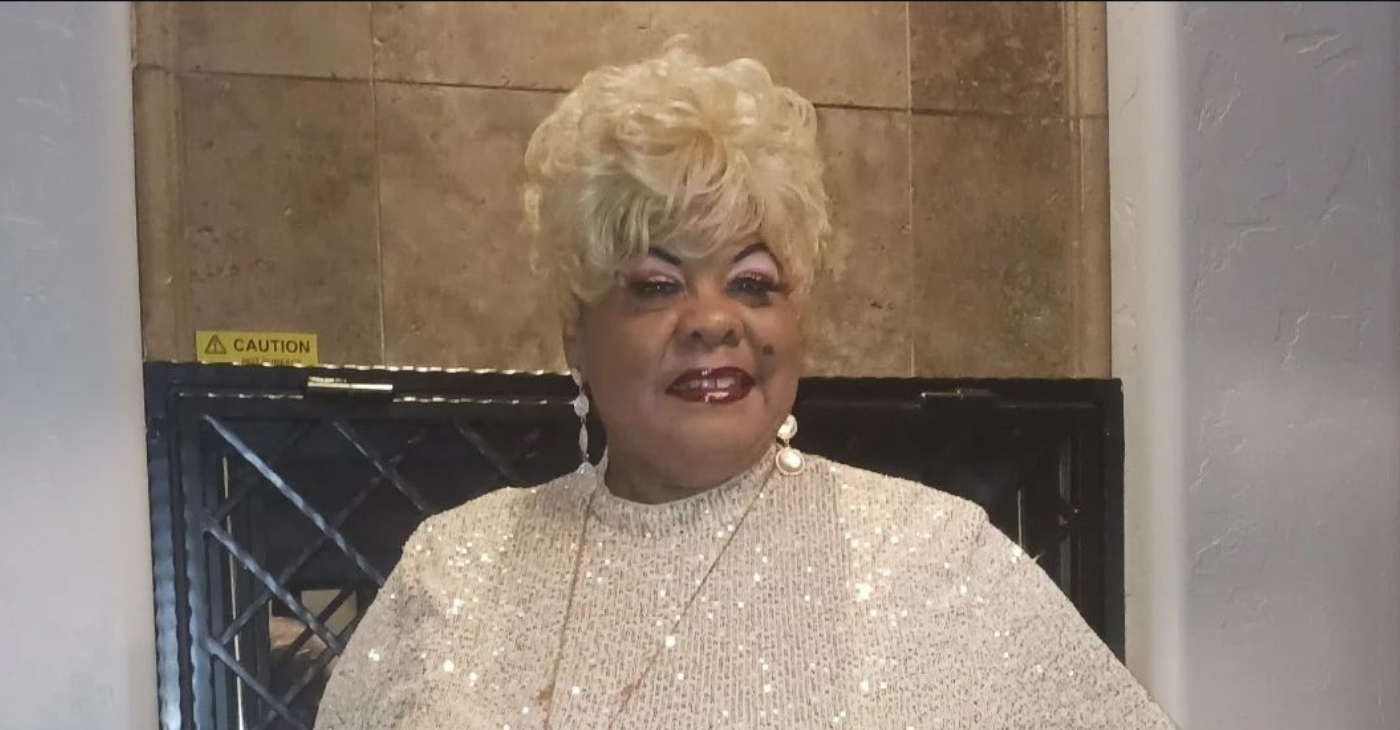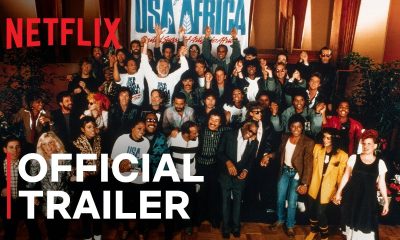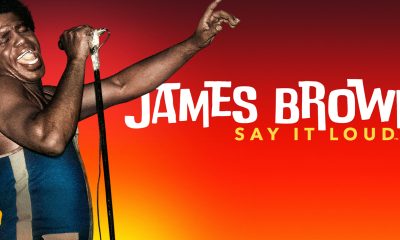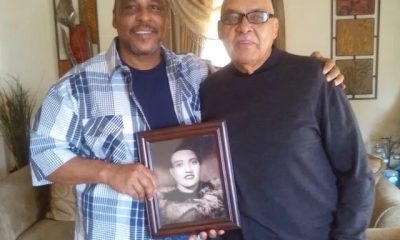Entertainment
‘King of the Blues’ Blues Legend B.B. King Dead at Age 89

In this Feb. 16, 2007 file photo, B.B. King performs at the Wicomico Youth and Civic Center, in Salisbury, Md. King died Thursday, May 14, 2015, peacefully in his sleep at his Las Vegas home at age 89, his lawyer said. (Matthew S. Gunby/The Daily Times via AP)
Ken Ritter, ASSOCIATED PRESS
LAS VEGAS (AP) — B.B. King, whose scorching guitar licks and heartfelt vocals made him the idol of generations of musicians and fans while earning him the nickname King of the Blues, died late Thursday at home in Las Vegas. He was 89.
His attorney, Brent Bryson, told The Associated Press that King died peacefully in his sleep at 9:40 p.m. PDT. He said funeral arrangements were underway.
Clark County Coroner John Fudenberg confirmed the death.
King’s eldest surviving daughter Shirley King of the Chicago area said she was upset that she didn’t have a chance to see her father before he died.
Although he had continued to perform well into his 80s, the 15-time Grammy winner suffered from diabetes and had been in declining health during the past year. He collapsed during a concert in Chicago last October, later blaming dehydration and exhaustion. He had been in hospice care at his Las Vegas home.
For most of a career spanning nearly 70 years, Riley B. King was not only the undisputed king of the blues but a mentor to scores of guitarists, who included Eric Clapton, Otis Rush, Buddy Guy, Jimi Hendrix, John Mayall and Keith Richards. He recorded more than 50 albums and toured the world well into his 80s, often performing 250 or more concerts a year.
King played a Gibson guitar he affectionately called Lucille with a style that included beautifully crafted single-string runs punctuated by loud chords, subtle vibratos and bent notes.
The result could bring chills to an audience, no more so than when King used it to full effect on his signature song, “The Thrill is Gone.” He would make his guitar shout and cry in anguish as he told the tale of forsaken love, then end with a guttural shouting of the final lines: “Now that it’s all over, all I can do is wish you well.”
His style was unusual. King didn’t like to sing and play at the same time, so he developed a call-and-response between him and Lucille.
“Sometimes I just think that there are more things to be said, to make the audience understand what I’m trying to do more,” King told The Associated Press in 2006. “When I’m singing, I don’t want you to just hear the melody. I want you to relive the story, because most of the songs have pretty good storytelling.”
A preacher uncle taught him to play, and he honed his technique in abject poverty in the Mississippi Delta, the birthplace of the blues.
“I’ve always tried to defend the idea that the blues doesn’t have to be sung by a person who comes from Mississippi, as I did,” he said in the 1988 book “Off the Record: An Oral History of Popular Music.”
“People all over the world have problems,” he said. “And as long as people have problems, the blues can never die.”
Fellow travelers who took King up on that theory included Clapton, the British-born blues-rocker who collaborated with him on “Riding With the King,” a best-seller that won a Grammy in 2000 for best traditional blues album.
Singer Smokey Robinson praised the music legend.
“The world has physically lost not only one of the greatest musical people ever but one of the greatest people ever. Enjoy your eternity,” Robinson said.
Still, the Delta’s influence was undeniable. King began picking cotton on tenant farms around Indianola, Mississippi, before he was a teenager, being paid as little as 35 cents for every 100 pounds, and was still working off sharecropping debts after he got out of the Army during World War Two.
“He goes back far enough to remember the sound of field hollers and the cornerstone blues figures, like Charley Patton and Robert Johnson,” ZZ Top guitarist Billy Gibbons once told Rolling Stone magazine.
King got his start in radio with a gospel quartet in Mississippi, but soon moved to Memphis, Tennessee, where a job as a disc jockey at WDIA gave him access to a wide range of recordings. He studied the great blues and jazz guitarists, including Django Reinhardt and T-Bone Walker, and played live music a few minutes each day as the “Beale Street Blues Boy,” later shortened to B.B.
Through his broadcasts and live performances, he quickly built up a following in the black community, and recorded his first R&B hit, “Three O’Clock Blues,” in 1951.
He began to break through to white audiences, particularly young rock fans, in the 1960s with albums like “Live at the Regal,” which would later be declared a historic sound recording worthy of preservation by the Library of Congress’ National Recording Registry.
He further expanded his audience with a 1968 appearance at the Newport Folk Festival and when he opened shows for the Rolling Stones in 1969.
King was inducted into the Blues Foundation Hall of Fame in 1984, the Rock and Roll Hall of Fame in 1987 and received the Songwriters Hall of Fame Lifetime Achievement Award in 1990. He received the Presidential Medal of Freedom from President George W. Bush, gave a guitar to Pope John Paul II and had President Barack Obama sing along to his “Sweet Home Chicago.”
Other Grammys included best male rhythm ‘n’ blues performance in 1971 for “The Thrill Is Gone,” best ethnic or traditional recording in 1982 for “There Must Be a Better World Somewhere” and best traditional blues recording or album several times. His final Grammy came in 2009 for best blues album for “One Kind Favor.”
Through it all, King modestly insisted he was simply maintaining a tradition.
“I’m just one who carried the baton because it was started long before me,” he told the AP in 2008.
Born Riley B. King on Sept. 16, 1925, on a tenant farm near Itta Bena, Mississippi, King was raised by his grandmother after his parents separated and his mother died. He worked as a sharecropper for five years in Kilmichael, an even smaller town, until his father found him and took him back to Indianola.
“I was a regular hand when I was 7. I picked cotton. I drove tractors. Children grew up not thinking that this is what they must do. We thought this was the thing to do to help your family,” he said.
When the weather was bad and he couldn’t work in the cotton fields, he walked 10 miles to a one-room school before dropping out in the 10th grade.
After he broke through as a musician, it appeared King might never stop performing. When he wasn’t recording, he toured the world relentlessly, playing 342 one-nighters in 1956. In 1989, he spent 300 days on the road. After he turned 80, he vowed he would cut back, and he did, somewhat, to about 100 shows a year.
He had 15 biological and adopted children. Family members say 11 survive.
___
Associated Press writers John Rogers and Mesfin Fekadu in Los Angeles contributed to this report.
Copyright 2015 The Associated Press. All rights reserved. This material may not be published, broadcast, rewritten or redistributed.
###
Arts and Culture
Promise Marks Performs Songs of Etta James in One-Woman Show, “A Sunday Kind of Love” at the Black Repertory Theater in Berkeley
“The (show) is a fictional story about a character named Etta, aka Lady Peaches,” said Marks. “She falls in love with Johnny Rhythm, leader of the Rhythm Players Band and headliners of Madam G’s Glitta Lounge.” Marks channeled the essence of Etta James, singing favorites such as “Sugar on the Floor” and “At Last.”

Special to the Post
It was “A Sunday Kind of Love” at the Black Repertory Group Theater in Berkeley on Saturday night, Dec. 7. The one-woman musical based on the music of Etta James featured the multi-talented singer Promise Marks
Marks, who wrote and directed the musical, also owns PM Productions.
“The (show) is a fictional story about a character named Etta, aka Lady Peaches,” said Marks. “She falls in love with Johnny Rhythm, leader of the Rhythm Players Band and headliners of Madam G’s Glitta Lounge.”
Marks channeled the essence of Etta James, singing favorites such as “Sugar on the Floor” and “At Last.”
In between her soulful songs, Marks narrated impactful moments of the love story and journey of blues and forgiveness.
Marks sultry voice carried the audience back to an era that echoed with the power of Black music and a time of great change.
Marks said James shared love for the Black community by singing at gatherings during the Civil Rights Movement uplifting the people.
“She spoke to the movement, spoke to the people, and let her music speak for itself,” Marks said.
Backing the musical’s monologues, images and videos of Etta James are projected for the audience to view. While the production is fictional, Marks infused script with the unfairness and heartbreak James experienced while performing.
Marks performed gospel artist Donnie McClurkin’s “We Fall Down” as she narrated acts of reconciliation and forgiveness among the characters at Johnny Rhythm’s deathbed.
Marks, who regularly sings for the Miss America Pageant, was asked to perform as Etta James last year. “(At the event) a lady yelled out to me: ‘You’re Etta James!’ And then the audience went crazy. I said to myself, ‘I may have something here,’” she said.
Within 12 months, Marks created the musical production, which featured a dozen songs honoring “the great legacy of Etta James,” she said.
Marks says she was saddened to see how Etta James was often judged by the struggles in her life and wanted to offer attendees a more layered view.
“Etta’s life was so big. I want people to know that she was more than her drug addiction,” said Marks. “We can’t make that her legacy. Her catalog is too amazing. You can’t just be that and have the catalog that she (created). I don’t want the addiction to be the focus: I want her music, her element, her sassiness, and what she brought to be the focus – her woman-ness, that she was strong, and I wanted to honor that.”
Set Designer Nora Burnette says she created the set segments to mirror James’ life story. A set designer for BRG since 2016, she explained that her process of researching the scenario and the character serve as her inspiration for her design.
“I try to design a set as close to real life as possible so that the actress can deliver the performance sincerely,” said Burnette. “By creating the right setting, it helps the actors release the true essence of a character.”
The set brought the story to life and absolutely floored Marks. “Once Promise (Marks) saw the actual set, she understood my vision: ‘Wow, you get me. You get it,'” Marks told the designer.
Born Jamesetta Hawkins, Etta James, began her career in 1954 and gained fame with hits such “At Last” and “I’d Rather Go Blind.” She faced a number of personal problems, before making a musical comeback in the late 1980s with the album “Seven Year Itch.”
Co-producer and BRG Development Director, Sean Vaughn Scott, works with Overseer Production. According to producer Pamela Spikes, “Marks talent truly does Etta’s life story justice.”
Pam Jacobs of Hercules, a friend of Marks’ mom, Jackie Smith, said, Marks “was fabulous and sang all of those songs flawlessly.”
“I’m so proud of my daughter,” said Smith.
Marks, who has served as an instructor for BRG, will return on Feb. 21- 23 for an encore run of the musical.
“It’s an honor to be a part of the BRG (Black Repertory Group) family and continue our executive director Dr. Mona Vaughn Scott’s vision for the Black Repertory Group theater,” said Marks.
The Black Repertory Group Theatre is located at 3201 Adeline St., Berkeley, CA 94703. For information, visit: BlackRepertoryGroup.com
Activism
Oakland Post: Week of December 11 – 17, 2024
The printed Weekly Edition of the Oakland Post: Week of December 11 – 17, 2024

To enlarge your view of this issue, use the slider, magnifying glass icon or full page icon in the lower right corner of the browser window. ![]()
Activism
Black Talk Radio Network’s Recent Podcast Offers Perspective on Nov. 5 Election
“Time for an Awakening” is a Black Talk Radio Network program that runs on Sundays from 7-9 p.m. According to the program’s website, past guests have included Dr. Molefi Asanta, BaBa Ashra Kwesi, BaBa Runoko Rashidai, Dr. Leonard Jeffies, Michelle Alexander. Boyce Watkins, State of Black Farmers series and many others.

Special to The Post
University of Houston Professor of African American Studies Professor Dr. Gerald Horne and renowned speaker and advocate for Pan-African unity, Obi Egbuna Jr, were in conversation on the podcast “Time for an Awakening” hosted by Bro. Elliott and Bro. Richard on Dec. 1.
“Time for an Awakening” is a Black Talk Radio Network program that runs on Sundays from 7-9 p.m.
According to the program’s website, past guests have included Dr. Molefi Asanta, BaBa Ashra Kwesi, BaBa Runoko Rashidai, Dr. Leonard Jeffies, Michelle Alexander. Boyce Watkins, State of Black Farmers series and many others.
With the election in the rearview mirror, Horne, a historian, and author of “The Apocalypse of Settler Colonialism” and “Jazz and Justice: Racism and the Political Economy of the Music,” raised the idea of a Black International Front Conference.
He described proposed locations and the need for independent political organizing in Black communities across the country, with a focus on local elections and alternatives to the direction of Black political leadership.
Joining the conversation in the second hour with valuable information was the External Relations officer to the Zimbabwe-Cuba Friendship Association, and former correspondent to the Herald, Zimbabwe’s national newspaper, Obi Egbuna Jr. A poet and playwright, Egbuna is most known for his passion in creating ties within and among the people and nations of the African diaspora.
He has organized chapters of the Pan African Student Youth Movement in St. Louis, Missouri, Seattle Washington, Charlottesville Virginia and Chicago, Illinois, Egbuna has also written several Resolutions to the United Nations covering a wide range of issues, including HIV/AIDS in Zimbabwe and Police Brutality issues in the United States.
To listen to the podcast, please go to https://timeforanawakening.com/?powerpress_pinw=111154-podcast.
Sources for this story include Wikipedia and Time for an Awakening media.
-

 Activism4 weeks ago
Activism4 weeks agoOakland Post: Week of November 20 – 26, 2024
-

 California Black Media3 weeks ago
California Black Media3 weeks agoCalifornia to Offer $43.7 Million in Federal Grants to Combat Hate Crimes
-

 Activism4 weeks ago
Activism4 weeks agoAn Inside Look into How San Francisco Analyzes Homeless Encampments
-

 Black History3 weeks ago
Black History3 weeks agoEmeline King: A Trailblazer in the Automotive Industry
-

 California Black Media3 weeks ago
California Black Media3 weeks agoCalifornia Department of Aging Offers Free Resources for Family Caregivers in November
-

 California Black Media3 weeks ago
California Black Media3 weeks agoGov. Newsom Goes to Washington to Advocate for California Priorities
-

 Activism3 weeks ago
Activism3 weeks agoOCCUR Hosts “Faith Forward” Conference in Oakland
-

 #NNPA BlackPress4 weeks ago
#NNPA BlackPress4 weeks agoPRESS ROOM: Clyburn, Pressley, Scanlon, Colleagues Urge Biden to Use Clemency Power to Address Mass Incarceration Before Leaving Office



























































